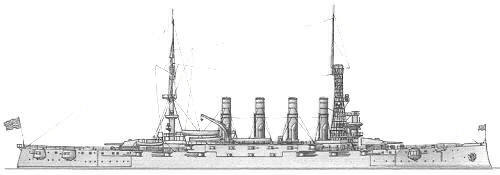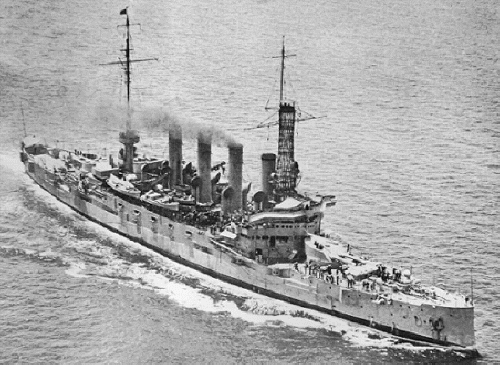

Tennessee 1906

Montana 1917
| No | Name | Yard No | Builder | Laid down | Launched | Comm | Fate |
| ACR10 | Tennessee, 5.1916- Memphis | 322 | Cramp, Philadelphia | 20.6.1903 | 3.12.1904 | 17.7.1906 | wrecked 29.8.1916 |
| ACR11, 7.1920- CA11 | Washington, 11.1916- Seattle | 14 | New York SB, Camden | 23.9.1903 | 18.3.1905 | 7.8.1906 | miscellaneous auxiliary 7.1931 |
| ACR12, 7.1920- CA12 | North Carolina, 6.1920- Charlotte | 57 | Newport News | 21.3.1905 | 6.10.1906 | 7.5.1908 | stricken 7.1930 |
| ACR13, 7.1920- CA13 | Montana, 6.1920- Missoula | 58 | Newport News | 29.4.1905 | 15.12.1906 | 21.7.1908 | stricken 7.1930 |
|
Displacement normal, t |
14500 |
|
Displacement full, t |
ACR10, 11: 15715 ACR12, 13: 15981 |
|
Length, m |
153.8 |
|
Breadth, m |
22.2 |
|
Draught, m |
7.62 mean |
|
No of shafts |
2 |
|
Machinery |
2 VTE, 16 Babcock & Wilcox boilers |
|
Power, h. p. |
23000 |
|
Max speed, kts |
22 |
|
Fuel, t |
ACR10: coal 1975 ACR11: coal 1939 ACR12, 13: coal 1950 |
| Endurance, nm(kts) | 6500(10) |
| Armour, mm |
ACR10, 11: Krupp and Harvey steel - belt: 127 (76 at ship ends), deck: 102 - 38, barbettes: 178 - 102, turrets: 229 - 127, casemates: 127, CT: 229 ACR12, 13: Krupp and Harvey steel - belt: 127 (76 at ship ends), deck: 102 - 38, barbettes: 203 - 102, turrets: 229 - 127, casemates: 127, CT: 229 |
|
Armament |
ACR10, 11: 2 x 2 - 254/40 Mk III, 16 x 1 - 152/49 Mk VI/VIII, 22 x 1 - 76/50 Mk III/V/VI, 12 x 1 - 47/40-45 Driggs-Schroeder Mk I/II, 2 x 1 - 37/40 Driggs-Schroeder heavy Mk I, 4 - 533 TT (beam) ACR12, 13: 2 x 2 - 254/40 Mk III, 16 x 1 - 152/49 Mk VI/VIII, 22 x 1 - 76/50 Mk III/V/VI, 12 x 1 - 47/40-45 Driggs-Schroeder Mk I/II, 4 x 1 - 37/40 Driggs-Schroeder heavy Mk I, 4 - 533 TT (beam) |
|
Complement |
856 - 914 |
Project history: Authorized under the Acts of 1.7.1902 (first two) and 27.4.1904 (second two). This class was a considerable improvement on previous US armoured cruisers. Of the 152mm guns 12 were on the main deck in two six-gun batteries separated by 6 76mm, and four in upper deck casemates, while of the 22 76mm, 12 were on the main deck and ten on the upper. Considerable use was made of electrical auxiliary machinery, the output of the dynamos being 600kW, 100kW more than in the Pennsylvania class.
Ship protection: Main belt thickness was 127mm. Armoured deck over citadel was 38mm behind the belt at flat part and connected with lower belt edge by 102mm slopes. This deck was 76mm with 102mm slopes at ship ends. Barbette bases connected with armour deck and were 102mm at lower edge. Upper part of barbettes was 178 or 203mm thick. Turrets had 229mm faces, 178mm sides, 127mm rears and 64mm crowns. Secondary guns were protected by 127mm casemates.
Modernizations: 1911, all: new cage foremasts were installed
1914 - 1919, all surived: - 12 x 1 - 152/49 (may be temporarily), 10 x 1 - 76/50; + 2 x 1 - 76/52 Mk X
1915, North Carolina (temporarily), 1917, Seattle (temporarily): + 1 catapult, 4 airplanes
Naval service: In 1916-1920 they were renamed to "exempt" names for built battleships. Missoula and Charlotte were both finally decommissioned in 1921, while Seattle was administrative flagship of the US fleet 1923-1927 and then receiving ship at New York until 1941 when she was re-classified as IX39 in February, 1941 and stricken in 1946. Memphis was struck by a 30m high tsunami: a fate not known to have happened to any other ship of her size, in the roadstead of Santo Domingo and was driven ashore, a total wreck.

Seattle 1924
© Ivan Gogin, 2014